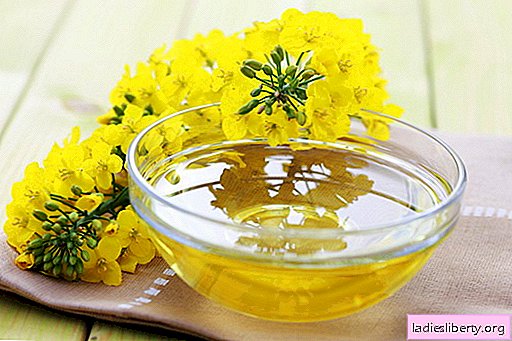
The Mediterranean climate is considered native to such a common plant as rape. But even in the countries of Europe he has taken root well and is growing quite successfully, giving offspring in the form of a huge amount of seeds. It is from these seeds that a useful and very inexpensive rapeseed oil is obtained. It turns out that this plant not only gives a rich crop of seeds, but has a beneficial effect on the soil, supplying it with nitrogen. Due to this property, rape ensures the productivity of the earth even after it fades. Rapeseed oil is used quite widely in many areas of industry, medicine and cosmetology. But what is its use and whether it has any harmful characteristics, it is worth talking about this in detail.
Technologies: rapeseed oil production options
Modern technological progress does not stand in one place, so the scheme for producing rapeseed oil is quite simple. As usual, in most cases, the pressing and squeezing technology is used: first the seeds are peeled, placed in a huge container, where they are boiled or heat treated under pressure. After this, the prepared rapeseed fruits are pressed and the oil is distilled off using special substances. As a result, cake remains, which also contains a small percentage of oil. It can again be distilled and squeezed leftovers or processed to add to animal feed.
In refined rapeseed oil there are continuous “utilities” that have a large positive effect on the human or animal organism. Among them are the following:
• A large percentage of linoleic, linolenic, oleic and other fatty acids that support the normal functioning of the cardiovascular apparatus, they improve blood count, regulate temperature and pressure.
• Rapeseed oil contains a large amount of vitamin E. As you know, it greatly affects the quality of the brain and vascular system, "knows how" to slow down the aging process, can inhibit the appearance of blood clots, and also accelerate the regeneration of epidermal cells.
Rapeseed oil is used by the aviation industry as a lubricant, and it is also widely used in rubber and even steel production.
Among other things, rapeseed oil is a biological diesel fuel widely used in industry. Given the desire of world manufacturers to reduce fuel toxicity, rapeseed oil is gradually becoming one of the most popular types of biofuels.
Characteristics: what are the benefits of rapeseed oil?
Based on the facts confirming how widespread canola oil is in world industry, we can talk about its useful characteristics. Perhaps it can not be compared in usefulness with olive or sea buckthorn oil, but nevertheless, rapeseed oil can boast of such properties:
1. First of all, rapeseed oil is rich in vitamin E and polyunsaturated fatty acids. Needless to say, these elements indicate the ability of the oil to support the body's immune forces, ensure decent functioning of the heart, blood vessels, brain, and also reduce the risk of heart attacks, strokes, hypertension and coronary heart disease.
2. Rapeseed oil also includes a fairly high percentage of a female type of hormone called estradiol. The level of this hormone increases naturally with the onset of the ovulation period. The skin of a woman becomes radiant and clean, and her hair is elastic and strong.
3. Thanks to this vitamin complex, the risk of breast cancer in girls tends to zero.
4. Want to lose weight faster? In this assistant, just rapeseed oil will become. It breaks down fats, lowers cholesterol, metabolism is seriously accelerated. It can be eaten, complementing salads and other dishes.
5. Rapeseed oil is very often used as an element of a diet. Independently, it is operated quite rarely. For example, it is added to kefir or protein diets, and is also used as a food supplement during the treatment of diseases of the gastrointestinal tract.
6. In addition, rapeseed oil will be appropriate in masks for face skin or hair. It heals small wounds, scratches, burns, strengthens the hair structure, perfectly moisturizes the skin.
Contraindications and potential harm to rapeseed oil
Rapeseed oil must be refined, as the crude liquid may contain a high percentage of erucic acid. It is not considered too useful for the body of an animal or human, as it may well slow down the process of growth and development, as well as puberty. In addition, due to the high percentage of erucic acid in rapeseed, a healthy person may have problems in the cardiovascular system, disorders in the liver and kidneys. When buying rapeseed oil yourself, be sure to pay attention to the indicators of erucic acid: normally they should not be more than 0.6%.
Of course, it is also worth mentioning the individual intolerance of individuals of various types of oils, including rapeseed. Allergy sufferers should not eat such a product, because there is a high risk of developing swelling, suffocation, rashes and itching.
However, you can not eat salads, first or second courses containing rapeseed oil for women with biliary tract ailments, pancreatitis and cholecystitis. Moreover, rapeseed oil is forbidden to use, suffering from chronic diarrhea or hepatitis, because in this case it has a negative effect on the liver.
It is worth considering, among other things, also some toxicity of rapeseed oil, which manifests itself during its heating. That is why nutritionists do not recommend eating it too much, and even less frying any food on it.
Recommendations: how to consume rapeseed oil
Rapeseed oil is allowed to be used as a basis for creating hair masks. It can simply be applied to the roots, rubbing into the skin of the head, and then cover your hair with polyethylene and a towel. It is enough to withstand just half an hour for the oil to work: it strengthens the hair roots, preventing hair loss, as well as the tips so that they do not break and do not split.
Another life-giving hair mask: with rapeseed oil and avocado. It is done in the following way:
• Half an avocado should be mashed,
• Add to it 1-2 tbsp. l rapeseed oil
• 1-2 drops of rosemary ether composition,
• And also 10 drops of vitamin A (retinol).
Cover the hair with this mixture, stretching from the roots to the ends. It is necessary to “wear” the mask on the hair for about 40 minutes, and then rinse off using a daily shampoo.
Combining rapeseed oil is permitted with argan, castor, burdock or olive. Note that rapeseed oil, as well as the rest, is difficult to wash off from the hair. Therefore, it is better to use the “yolk plus water” solution or a small amount of lemon juice also mixed with water when rinsing. And the rule of thumb: do not buy low-quality oils, then they will be washed off the hair the first time.
Try making face and hand masks with rapeseed oil at home. For example, a simple mask with honey and yogurt will provide excellent protection against freezing air and wind in winter. It is only necessary to mix 1 tbsp. l rapeseed oil, the same amount of yogurt and 1 tsp. honey.
But the mask with grated banana and rapeseed oil will help strengthen the skin in the neckline. Supplement the mass with lemon juice and the mask will also become whitening. Want a home scrub? Nothing is simpler: add brown sugar to banana and butter. In this case, the mixture must be applied to the skin immediately after preparation, otherwise sugar can dissolve quickly.
As a dietary supplement, rapeseed oil will help to improve intestinal motility. It can be added to salads with fresh vegetables or cook meat sauces based on it. For example, the popular Pesto sauce, which is prepared using olive oil, can be modified: mix basil, parmesan cheese, a few nuts (pine or walnut), garlic, pepper and salt. All this should be whipped in a blender and you will get a great sauce for meat, aromatic and very healthy.











